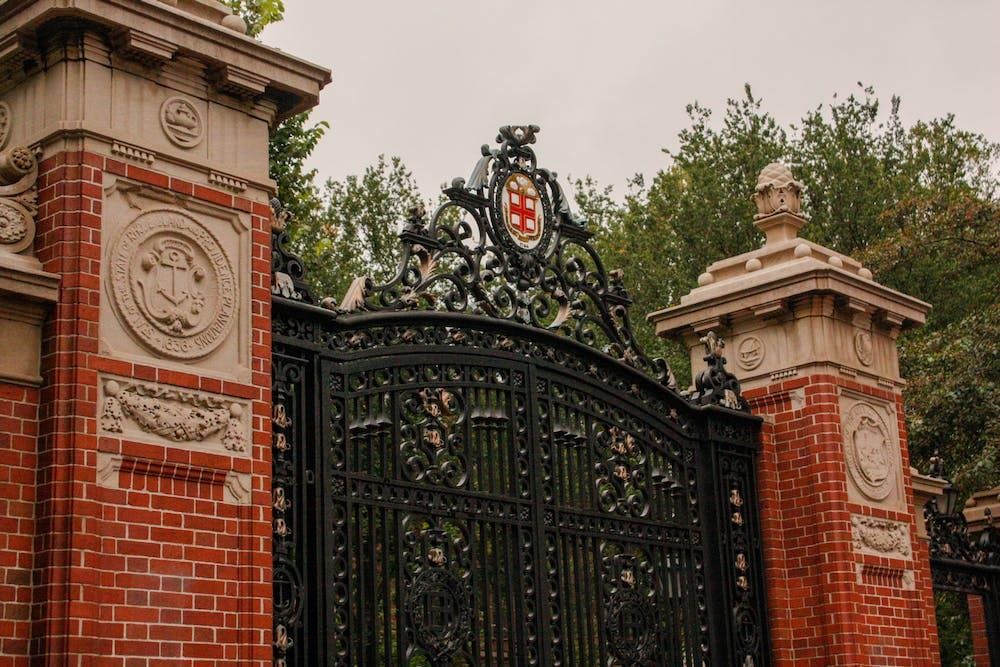On Nov. 8, all eyes were on University Hall as 20 student demonstrators, members of the newly formed student group BrownU Jews for Ceasefire Now, were arrested after staging a sit-in at the building. The culminating moment came after a busy day of student activism, with Brown Students for Justice in Palestine also organizing a walkout attended by more than 400 students earlier that day.
More than a week after the arrests, SJP organizers told The Herald that, in addition to their own ongoing activism, their organization continues to support and work alongside Jews for Ceasefire Now, particularly the 20 students who now face trespassing charges and are scheduled to appear in court on Nov. 28. On that day, SJP plans to pack the courthouse.
“The arrests on Nov. 8 have reinforced the importance of standing alongside our peers,” SJP organizers wrote in a statement to The Herald. “SJP calls on Brown University to drop all charges against the 20 peaceful protesters from JFCN.”
The students participating in the sit-in had refused to voluntarily leave University Hall until President Christina Paxson P’19 P’MD’20 publicly committed to calling for a ceasefire in Gaza and supporting a divestment of Brown’s endowment from “companies that enable war crimes in Gaza” at the next meeting of Brown’s Corporation, The Herald previously reported.
SJP shares these demands, organizers told The Herald, including “that the University divest from companies involved in the continued oppression of Palestinian life under the Israeli apartheid state.”
Multiple human rights organizations, as well as an independent human rights expert commissioned by the United Nations, have published reports stating that the Israeli government’s treatment of Palestinians amounts to “apartheid.”
“We believe that collaboration with our peer student groups is essential to furthering our cause,” organizers wrote to The Herald. Organizers added that the “collective call for a free Palestine” represents the “diverse array of students who support Palestine,” putting additional pressure on the Brown administration to divest.
Although the sit-in was an “independent action” from SJP’s organizing, students with JFCN told The Herald they are in “strong coalition” with Brown SJP.
“Oct. 7 hit us, and I can say specifically me, in a visceral way that really can’t be explained in words,” said Rita Feder ’24, a representative from JFCN. “There is no world in which I look at the events of Oct. 7 as a victory in any capacity. Rather, Oct. 7 is a very loud reminder that Jewish and Israeli safety can never come at the cost of Palestinian safety.”
“More Palestinians are killed every year, Palestinians suffer at the hands of state violence,” Feder continued. “And now it's become really clear that … there is no world in which Israelis and Jews can remain safe while that is the status quo.”
“Through our ongoing relationship with JFCN, SJP has become better able to support our Jewish pro-Palestinian peers, for whom Palestinian liberation is uniquely intertwined with their religious and cultural experience,” SJP organizers wrote. “We have opened specific avenues of communication with JFCN, and we turn to members of the group to ensure that Jewish voices are represented in SJP’s messaging and action.”
Since Nov. 8, SJP has worked alongside other activist and affinity groups to “gather support and provide educational resources,” including putting together a teach-in in collaboration with Black students at the University about the histories of Palestine and Black organizing on campus.
“In this time of conflict, it is essential to the values of SJP that we, as members of the Brown community, find unity,” SJP organizers wrote, reaffirming “SJP’s ongoing commitment to ensuring that our activism is informed by the diverse community of Brown’s students — Palestinian, Israeli, Jewish, Muslim and others. All people are deserving of liberation.”
SJP also supported a walkout organized by the Brown University Palestine Solidarity Caucus on Friday, the third at the University since Hamas’s Oct. 7 attacks on southern Israel and Israel’s subsequent retaliation against Gaza, which has targeted the strip through airstrikes, blockades and a ground invasion.
On Friday, students gathered in front of the steps of Faunce House, where organizers had unfurled banners covered with the names of the over 11,000 Palestinians who have been killed since Israel’s military response began. The names had been written the day before between 6 a.m. and 4 p.m. on the Main Green, an effort organized by the Brown Arab Society.
“We look forward to holding even more conversations with our peers to become unified in our work to hold the University accountable for its role in the genocide in Palestine,” SJP organizers wrote, citing the support they have received from faculty, students and alumns — 1,500 of whom signed the group’s list of demands to the Brown administration — despite “the mischaracterization and outright attacks on SJP chapters across the nation.”
SJP has also continued to engage in conversations with University administrators about protecting student demonstrators, “particularly those with vulnerable identities,” and ensuring students “can exercise their First Amendment right to protest while keeping themselves and each other safe.”
The group is hopeful for a campus climate where “all students are freely able to support the causes they are passionate about.”
Haley Sandlow is a contributing editor covering science and research. She is a junior from Chicago, Illinois studying English and French.





